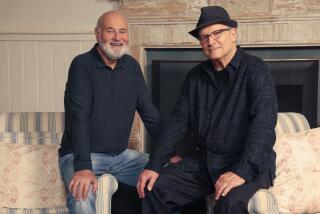Film Makers Pollack, Brooks Pay Tribute To Their Early Teachers
Film makers Sydney Pollack and Mel Brooks said thank you last week in Santa Monica to the teachers who changed their lives.
Speaking to 200 teachers and administrators from performing and visual arts schools, Pollack, whose directorial credits include “Tootsie” and “Out of Africa,” recalled how James Lewis Casaday introduced him to the life of the mind in the South Bend, Ind., public schools.
Now retired, Casaday ran the district’s drama programs when Pollack, 54, was growing up. Pollack, who played Krazy Kat in a grade school revue and starred at 14 as Elwood P. Dowd in “Harvey,” said Casaday gave him “this incredible sense of discovering a whole new world.”
Still in Touch
Casaday taught Pollack how to analyze and interpret plays and exposed him to the ballet and other experiences uncommon among his football-playing crowd. Pollack, whose father wanted him to become a dentist, said Casaday alerted him to the very possibility of living a creative life.
Casaday, whom Pollack remembers as having “no life, no private life,” continues to keep a critical eye on his former student. “He still writes me a letter saying he thought I did fairly well with ‘Out of Africa’: ‘The pacing was good.’ ”
“Out of Africa” won seven Academy awards in 1986, including Best Picture and Best Director. Pollack also won an Oscar in 1969 for his direction of “They Shoot Horses, Don’t They?”
The film maker also praised acting teacher Sanford Meisner, with whom he studied at the Neighborhood Theater in New York City. Pollack said that in Meisner’s classes, too, he had a sense of “falling forward into new areas of understanding and experience.”
“They are, in a sense, the people who dictated my whole creative life,” Pollack said of his former teachers.
In theater, Pollack said, great teachers do more than teach a student the difference between a good performance and a bad one. The best teachers also find ways to elicit good performances, he said.
“I think it’s a wonderful thing you do and I applaud you,” Pollack told the teachers at the convention, staged by the Crossroads School, a private school of the arts in Santa Monica.
Pollack told the audience that a good education in the arts hones perception in every area of a person’s life, including his or her capacity for pleasure. Students who don’t continue to perform themselves benefit by becoming more insightful audiences.
Mel Brooks, whose movies include “Blazing Saddles” and “Young Frankenstein,” said the teacher who helped to change his life taught French in a Brooklyn public school.
“Mr. Rubenstein,” Brooks recalled, told him that he was a talented French student, with an impeccable accent, even though he was failing French. “He was really a fan, my first fan,” Brooks said, reminding the teachers how much young people, even hilarious, talented ones, need their encouragement.
Brooks, who won a screen-writing Oscar for “The Producers,” appeared with his actress wife, Anne Bancroft, who won an Oscar for her role as teacher Annie Sullivan in “The Miracle Worker.”
A member of the audience asked Brooks how he achieved his comic effects. “That’s a good question,” said Brooks. “I’m not going to answer it, but it’s a great question.”
In fact, Brooks said, “you don’t try to make it funny. You try to make it honest and earnest.” The formula he depends on, Brooks said, is “situation--absurd, characters--earnest and real.”
Bancroft, who plays actor / author Harvey Fierstein’s mother in the forthcoming “Torch Song Trilogy,” advised the drama coaches in the audience to teach their students to relax on stage.
“If you can’t live on the stage, you don’t belong there,” she said. Meditation is one way to become comfortable on stage, but there are others as well.
“Sissy Spacek’s solution to that is half a beer,” she said.
Both Brooks and Bancroft said a performer must find his satisfaction in the process of performing. “You must never, never go for a result,” said Brooks. “The process is everything.”
Bancroft agreed, adding, “The pleasure and the thrill is all in the doing.”
As an actor or film maker, Brooks said, “you do your thing and then crash to your knees and pray to God that somebody likes it.”
Bancroft singled out Arthur Penn, who directed her in “The Miracle Worker,” as the best teacher--and director--she had ever known.
“And he’s short,” said Brooks. “You don’t have to be tall to be great.”
More to Read
The biggest entertainment stories
Get our big stories about Hollywood, film, television, music, arts, culture and more right in your inbox as soon as they publish.
You may occasionally receive promotional content from the Los Angeles Times.










